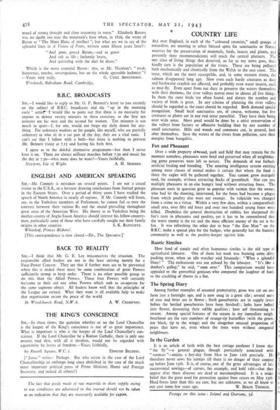COUNTRY LIFE
ALL over England, in each of the " coloured counties," small groups of naturalists are meeting to select blessed spots fix sanctuaries or Nature reserves for the preservation of mammals, birds, insects and plants, and presently their recommendations will reach the central planners. The one class of living things that deserved, so far as my news goes, their kindly care is the population of the rivers. These are being polluted both mechanically and chemically from the Welsh to the east coast. The trout, which are the most susceptible, and, in some western rivers, the salmon disappeared long ago. Now even such hardy creatures as dace and freshwater crayfish are affected, and probably even water insects, such as may-fly. Even apart from our duty to preserve the waters themselves with their denizens, the river valleys matter most to almost all live things. In them the rarer birds *are often found, and always the number and variety of birds is great. In any scheme of planning the river valleys should be regarded as the coast should be regarded. Both demand special recognition. Small local sanctuaries are, of course, welcome, but few creatures or plants are in any real sense parochial. They have their being over wide areas. More good would be done by a strict preservation of the valleys from factory or offensive building than by any number of small sanctuaries. Hills and woods and commons can, in general, look after themselves. Save the waters of the rivers from pollution, save their margins from bungalitis.
Fox and Pheasant
Over a wide property of .wood, park and field that may remain for the moment nameless, pheasants were bred and preserved when all neighbOur- ing game preserves were left to nature. The demands of war forbade artificial feeding and breeding. The amazing intelligence system existing among most classes of animal makes it certain that where the food is there the eagles 'will be gathered together. You cannot grow marigold seed, for example, without attracting flocks of greenfinch. Nor can you multiply pheasants in an else hungry land without attracting foxes. The pheasant oasis in question grew so popular with vermin that the owner, who had let the shooting, intervened, for the foxes had become a plague from which poultry also were not exempt. So vulpicide was changed from a crime to a virtue. Within a very few days, within a comparatively small area, over fifty old foxes and over two hundred young foxes were killed. Doubtless the general destruction of rabbits has sharpened the fox's taste in pheasants and poultry, yet it has to be_ remembered that the worst enemy is the rat and the most efficient enemy of the rat is the fox. It was refreshing the other day to hear " the Zoo Man " on the B.B.C. make a special plea for the badger, who generally has the hunting community as well as the poultry-keeper against him.
Rustic Similes How fond of simple and often humorous similes is the old type of agricultural labourer. One of them last week was burning some dirty packing straw, when an idle watcher said fatuously: " What a splendid blaze! " The enthusiasm was not echoed by the labourer. " It's like a donkey's gallop," he said, " soon over." This comparison would have appealed to the proverbial geniuses who compared the laughter of fools to the crackling of thorns in a fire.
The Spring Diary
Among further examples of seasonal prematurity, grass was cut on one farm just a fortnight ago, and is now snug in a great silo ; several sorts of rose and brier. are in flower ; fresh gooseberries are in supply (even before the bottled gooseberries have been finished); leeks have bolted into flower, destroying their edible qualities ; bees arE threatening to swarm. Among special features of the season in my immediate neigh- bourhood are the rare numbers of orange-tip butterflies (with the green, not black, tip to the wings) and the altogether unusual proportion of pears that have set, even where the trees were without congenial neighbours.
In the Garden It is an article of faith with the best cottage gardener I know that " the fly "—a general plague, though particularly associated with " turmuts "—enjoys a hey-day from May to June r2th precisely. He therefore never sows his turnips till there is no danger of their coming up before June r3th. It is, of course, one of the great advantages of late successional sowings—of carrots, for example, and kohl rabi—that they appear after these diseases are dead or metamorphosed. It is a wider belief that the great need for protection against frost ceases on May 13th. Hard frosts later than this are rare, but not unknown, as we all knew to
Postage on this issue : Inland and Overseas, id.


























 Previous page
Previous page